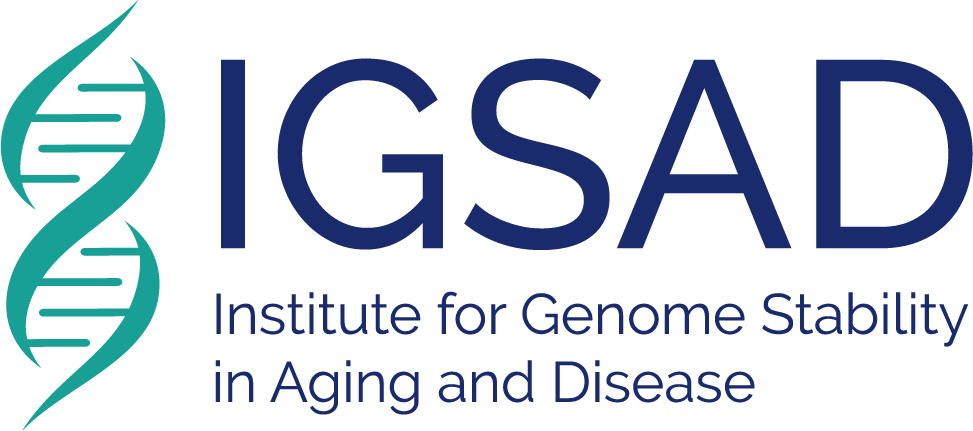Professor Jan Hoeijmakers’ s group has a longstanding interest in understanding the molecular mechanisms of eukaryotic DNA repair and the clinical consequences of defects in repair pathways. By generating and studying series of mouse mutants in specific DNA repair systems the Hoeijmakers lab highlighted the importance of DNA damage for accelerated and normal aging and associated multi-morbidity. The current aim of the Hoeijmakers team is to elucidate how DNA damage, senescence, apoptosis and stress-induction affects the stem cells niche and contribute to the process of skin aging which benefit in potential interventions that prevent, delay or revert skin aging, including impaired wound healing and barrier function.
Our research: Aging can be characterized as an intrinsic process of progressive functional decline of cells, tissues and organs, ultimately leading to the demise of the entire organism. Functional decline as observed in aging can be explained by accumulation of macromolecular damage, which gradually impairs cellular functions. Currently, DNA damage gains increasing attention, as one of the prime instigators of aging in mammals. DNA lesions affect vital genome functions including gene expression and accurate DNA replication, leading to cellular functional decline and malfunction, replicative arrest (cellular senescence) or cell death, all of which may contribute to age-related pathologies. Alternatively, unrepaired DNA injury in proliferating cells leading to mutations and chromosomal aberrations may promote cancer. Importantly, the main overall risk factor for cancer is also age, consistent with the concept of time-dependent accumulation of DNA damage. Therefore it is important to better understand the role of DNA damage in skin aging and in various age-related pathologies. Prof. Hoeijmakers’s group aims to: assess the relevance of repair mutants for normal skin aging, to investigate molecular mechanisms reflecting DNA damage signatures during skin aging and finally to design strategies to delay or revert aging-associated pathologies in the skin.
Our successes: The research team of Jan Hoeijmakers studied human progerias and prematurely aging mouse mutants exhibiting multi- morbidity which are caused by deficiencies in genome maintenance. Besides working with human patients, Hoeijmakers’ s team generated and studied multiple short-lived DNA repair mutant mice, e.g. the Ercc1Δ/- mutant (lifespan ranges from 16-24 weeks), XpdTTD- XpcKO (4-8weeks). The excessive work led to the realization that both in mice and man accelerated aging correlates with DNA repair deficiency, highlighting the importance of DNA damage as one of the main drivers of aging. Detailed gene expression profiles generated from progeroid animals revealed close resemblance to natural aging and simultaneously disclosed a highly conserved anti-aging ‘survival response’, providing links with both aging and longevity. Based on knowledge from the progeria models the research team discovered recently that dietary restriction (reduction of food intake without malnutrition), as the only known universal anti-aging intervention, extends life- and healthspan in DNA repair mutants to a -for mammals unprecedented- extent of ~200%, with disproportional benefit for neuronal functioning.
Our goals: The overall goal of the Hoeijmakers lab is to fully understand how accumulating DNA damage contributes to skin aging and to various age-related processes like stress-induced stem cell differentiation, cell death and cellular senescence. From the existing knowledge the groups aims to design rational-based interventions, which effectively prevent or delay the onset of major aging-associated skin diseases. The ultimate goal is to find ways to sustain a healthy skin and thereby improve quality of life for the growing aging population in developed countries world-wide.
Our methods/techniques: Professor Hoeijmakers group uses various mouse models, such as DNA repair deficient mouse mutants (systemic or tissue-specific mutants, i.e.: Ercc1Δ/- , XpdTTD - XpcKO ), and transgenic mice for selective elimination of senescent cells together with naturally aging mice to model age-related skin pathologies and to further assess the relevance of the repair mutants for normal aging. The Hoeijmakers team also has expertise in developing and implement novel next generation sequencing protocols to identify and characterize the molecular mechanisms linked to normal and accelerated skin aging and longevity, most notably DNA damage induced transcriptional stress.

